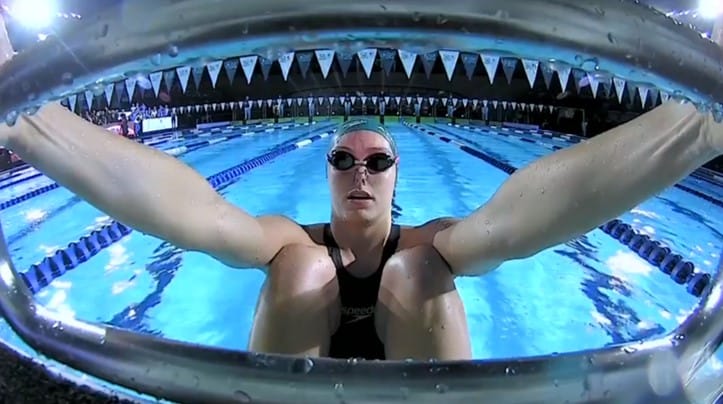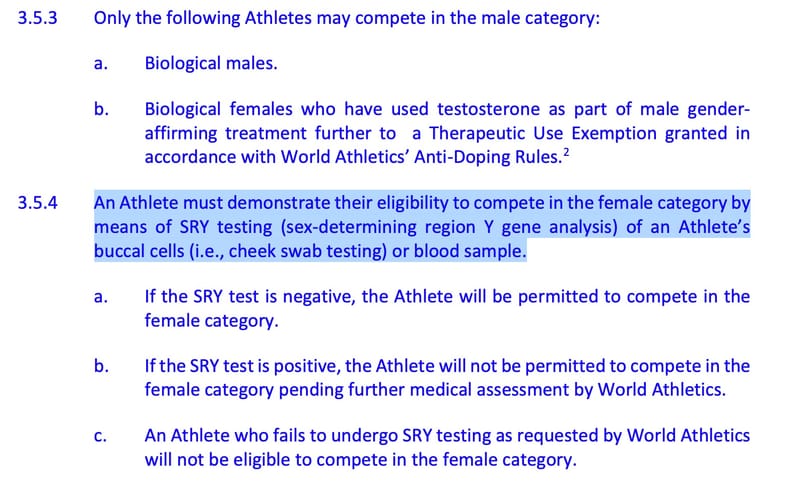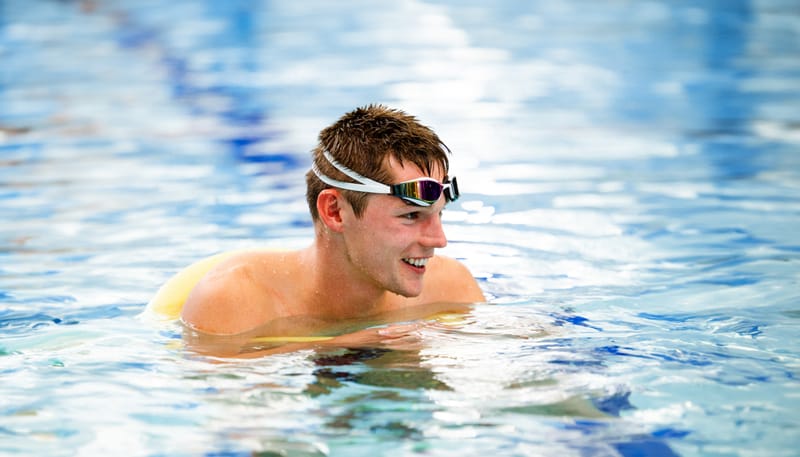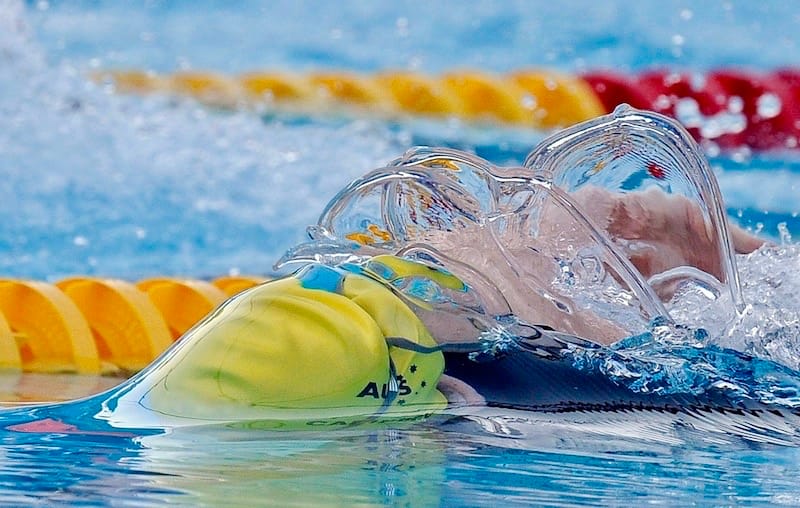World Aquatics Reaches Settlement With Swimmers In I.S. League Dispute & Sets Up $4.6 Million Fund
End in sight for FINA dispute with swimmers over International Swimming League as World Aquatics settles, pending court approval, and sets up support fund. ISL case not quite done, however: "Only the lawsuit filed by the ISL against FINA remains pending"
World Aquatics has reached an unspecified settlement with swimmers in the U.S. lawsuit linked to the international federation's attempts to block participation in the International Swimming League (ISL) in 2018 and 2019.
The settlement is subject to court approval.
In addition to the settlement, which is understood to cover at least some, if not all of the legal costs of the swimmers, the global regulator, which changed its name from FINA to World Aquatics in late 2022, has set up a swimmer support fund of $4.6m. The money will be distributed to:
"... swimmers who signed contracts to compete at the International Swimming League (ISL) event in Turin in 2018 and in the 2019 ISL season..."
It is not yet clear how and when and in what timeframe the money would be available to swimmers nor precisely to whom the money would be due beyond the generality of the quote above.
At the time the ISL teams were being formed, around 150 swimmers were contracted, which would convert to around $30,000 each, if that number of athletes is roughly in line with what is planned. World Aquatics has not confirmed such details as yet.
A reminder: the plaintiffs, swimmers Tom Shields, Katinka Hosszu, and Michael Andrew, sued the global swimming governing body in relation to the International Swimming League (ISL). They did so on behalf of the wider community of elite swimmers who wished to race at the ISL.
They filed a class-action lawsuit alleging FINA violated U.S. antitrust laws by attempting to prevent swimmers from participating in the new professional league, which was a competitor to FINA-sanctioned events. Key points in the case:
- The lawsuit cited violations of the Sherman Antitrust Act, alleging FINA engaged in anti-competitive practices to monopolise the sport and prevent competition from the ISL.
- The ISL filed a separate, but related, antitrust lawsuit against FINA at the same time and supported the swimmers in their efforts.
- After both sides had points found in their favour and against them, World Aquatics was given the last thumbs up in the legal dispute in a ruling from a U.S. District Court that noted how FINA had made changes to its approach to competition and had allowed swimmers to compete in the ISL without penalising them. We reported that last ruling here.
- A final judgement appears to be pending yet. In its statement, World Aquatics notes: "Only the lawsuit filed by the ISL against FINA remains pending."
In its statement announcing the settlement today, World Aquatics seeks to distance itself from the ISL saga in words delivered by the regulator's president Husain Al Musallam when he suggests "This lawsuit dates back to the previous management of FINA...".
In fact, several key figures involved in the dispute with ISL remain in power and positions of authority and influence, including former vice-president and current treasurer Dale Neuburger of the United States.
As we note below, the tone of a FINA challenge driven not only by former director Cornel Marculescu but the then president Julio Maglione, whose candidature for a role he occupied for three terms, was backed and promoted by Neuburger, was reflected in most uncomfortable fashion in court documents that had to be disclosed as part of the bitter dispute with the ISL founded and run by Ukrainian billionaire and Putin opponent Konstantin Grigorishin.
The Statement from World Aquatics Today:
Through this settlement, World Aquatics is setting up a fund of $4.6 million that will be distributed to swimmers who signed contracts to compete at the International Swimming League (ISL) event in Turin in 2018 and in the 2019 ISL season. The settlement fund will ensure swimmers are more than fully compensated following the 2018 and 2019 ISL seasons.
World Aquatics’ President, Husain Al Musallam, said that he was delighted that a resolution had been reached that brings to a close years of litigation, but more importantly, will significantly benefit the sport’s athletes.
“This lawsuit dates back to the previous management of FINA, and, regrettably, it has dragged on for so many years. However, I am pleased that we are finally able to step in and provide this significant sum of money for the swimmers, many of whom were badly let down. I do not believe that it would have been fair for our athletes to continue to suffer financially, and this settlement ensures that the swimmers are fully compensated and reflects World Aquatics’ continuing commitment to the development of the sport of swimming and support for swimming athletes around the world.”
World Aquatics looks forward to the court’s approval of the settlement. Only the lawsuit filed by the ISL against FINA remains pending.
The statement ends with a note on current funding, which also says something about the impact of the ISL on World Aquatics stepping up to give athletes a better lot.
"World Aquatics paid out USD 7.1 million in prize money to swimmers in 2024, while aquatics athletes collectively earned USD 11.1 million at World Aquatics events that year—the highest figures in the organisation’s 116-year history."
In some regards, the statement from Al-Musallam, who was a member of the FINA Bureau at the time of the ISL dispute, goes some way to acknowledging that matters were not handled well and that the federation has since changed course when it comes to listening to athletes and understanding that the international federation is not an employer of athletes and cannot prevent them from earning a living in competitions held within the rules of the sport by organisations that are not affiliated to the regulator.
In European context, the global swim regulator's position was even weaker than it was in the U.S., as was made clear by a ruling of the European Commission in favour of skaters but pertinent to all sports.
Background
- The European Commission decided in December 2017 that the ISU's penalties for participating in unauthorized speed skating competitions violated EU antitrust law.
- The ISU appealed the Commission's decision to the General Court and then to the Court of Justice.
- The final judgment was rendered by the Court of Justice in December 2023, confirming the initial decision.
That final ruling in the International Skating Union (ISU) v Commission case: The European Court of Justice (ECJ) confirmed the European Commission's decision that the ISU's rules requiring prior approval for competitions and imposing severe penalties on athletes for unauthorised events breached EU competition law because they lacked transparent, objective, and non-discriminatory criteria. Key Points of the Ruling:
- ISU Rules Unlawful: The Court of Justice found that the ISU's rules had an anticompetitive object, restricting competition to the detriment of athletes, consumers, and audiences.
- Lack of Guarantees: The rules were deemed unlawful because they did not include any guarantee that they were transparent, objective, non-discriminatory, and proportionate.
- Market Foreclosure: The ruling clarified that these rules give the ISU an undue advantage over competitors and lead to unfavourable effects for athletes and audiences.
- Application of Article 101 of the TFEU: The case confirmed the application of EU competition law (Article 101 of the Treaty on the Functioning of the European Union) to dominant undertakings like the ISU.
The European Commission made clear at the time that the ruling applied to all sports, and while it would not send the same instruction sent to the ISU to all federations, I would act if athletes or their representatives raised the same or similar complaints to those at the heart of the skating dispute.
Neither the ISL nor swimmers chose to challenge FINA in that European Union context.
Meanwhile, for anyone who wishes to recall just how bitter the dispute swimming was and how determined FINA governors were to halt the ISL's progress by threatening domestic federations, the Outside feature below, complete with Russian intrigue and links between FINA and Putin, remains an insightful monument to all that needed to change at FINA before a reform process still underway led to a rebranding to World Aquatics but, so far, has left in place and in positions off power and great influence some of those directly involved in the fight with ISL and the athletes World Aquatics has now settled with, subject to court approval.
OUTSIDE: THE PLOT TO KILL THE OLYMPICS
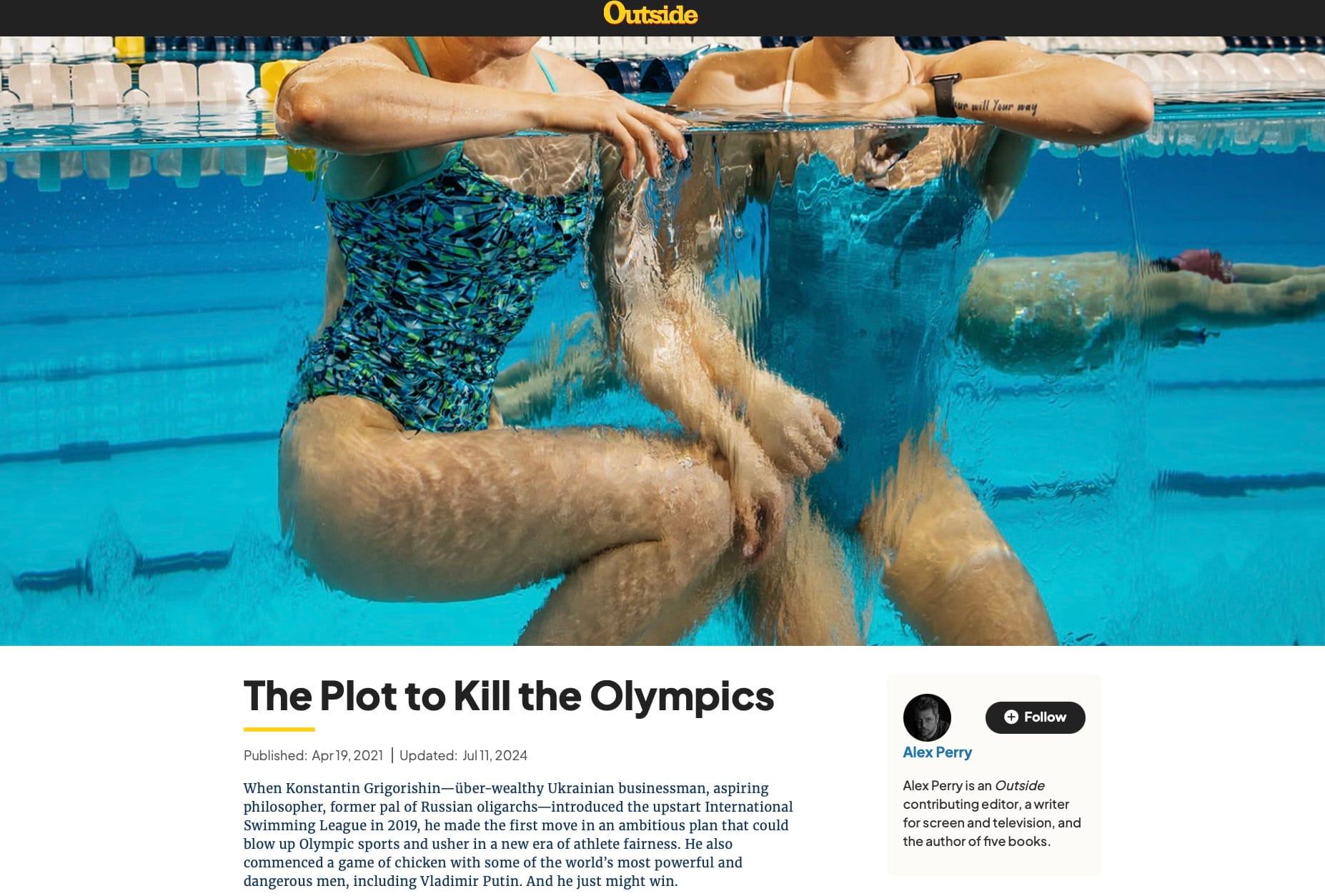
- Our SOS coverage of the ISL saga forms part of our deep archive, which is being made available to subscribers in a phased release. That will include an ISL special this autumn.
A few reminders of the serious and disturbing undertones in the dispute, plus extracts, follow...
